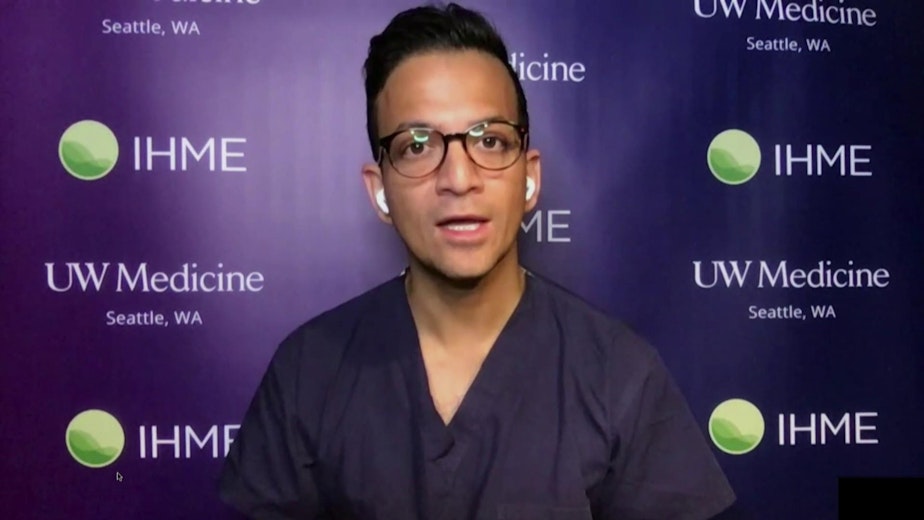Promising vaccine results amid spike in COVID-19 cases

The pharmaceutical company Pfizer has released promising news in regards to a Covid-19 vaccine. During the companies COVID-19 vaccine trials, early analysis shows their vaccine is more than 90% effective at preventing the virus. This news is timely as the United States and Washington State are currently heading into the biggest surge of coronavirus cases yet.
Dr. Vinay Gupta is a pulmonologist and critical care physician at the University of Washington. He joined KUOW to discuss the potential Covid-19 vaccine and rising cases in Washington state.
What did you make of this vaccine announcement today from Pfizer?
I'm cautiously optimistic. And it's hard not to be because we're all looking for a light at the end of the tunnel, and so 90% efficacy to prevent an infection amongst volunteers previously on infected with COVID-19. That's something to be excited about. And so we're cautiously optimistic. What I'll say, though, is that as with anything in public health, there's what study shows, and then there's what one can do in terms of an intervention to improve public health at scale.
So how are we going to get this vaccine into the arms of Americans potentially two times since this is a two dose regimen, and especially because this vaccine requires cold chain, meaning, right at the point of inoculation when this vaccine goes into someone's arm and needs to be stored in a fridge that's keeping that vaccine at a temperature of minus 110 degrees Fahrenheit. That is an enormous logistical challenge to distribute a vaccine quickly because we don't have that capability at scale.
Our Washington State Department of Health is sounding the alarm about an all-time high number of cases being reported here in just the last week. Tell us what are you seeing right now in terms of patient volumes at work? What are your colleagues seeing? And what are you bracing yourself for in the next several weeks?
Number one, we know that ICU cases of COVID-19 in the Puget Sound area are increasing at some of the highest levels we've seen since the start of this pandemic, when Seattle was early epicenter. So, numbers of individuals on ventilators with COVID-19 is increasing across all our area hospitals. Number two, all of us are hurting for the worst yet to come. Because respiratory viruses like cold dry air, because we already have a high baseline level of cases circulating in our environment, and in our events across the country. And number three, we know that people are tired, even here in Washington State, Seattle, people are tired.
And so we are expecting the worst to come ahead. And we need our health systems must be prepared. What doesn't get talked about enough is while ICU beds and hospital bed availability is key, having adequately trained ICU providers, respiratory therapists, nurses, doctors, dialysis nurses, often that's the key supply limitation. We just don't have enough, adequately-trained health providers. And we need to focus on that, because that's going to be a key piece moving ahead.
You talk about COVID fatigue, many of us are feeling it. How do local officials pierce through that fatigue to convey the risks that we're facing and what we will be facing over the next couple of months?
Sponsored
We need to just keep messaging on the science. That's what I've been doing on any platform I have, give actionable advice, and give guidelines on how people can normalize parts of their life in safe ways. And I think if we talk about that, if we empower individuals with real knowledge, real tools on how to go grocery shopping safely, how to go to the park safely, how to perhaps have an outdoor dinner at a restaurant safely, even though it's getting colder outside, then people will feel like we're public health officials, elected leaders are meeting them where they are. How do we engage with activities that are good for our mental health and potentially see loved ones, but do so safely? We just haven't had enough time to talk about that. Because so many of us who do have platforms have been trying to counter dangerous misinformation.
So I'm hopeful that and now in talking about guidance for safe engagement in public, that people will feel like we're meeting them where they are which is they're fatigued, and they want to go out they want to see loved ones.
Dr. Vin Gupta is a Pulmonologist and critical care physician with the Institute for Health metrics and evaluation at the University of Washington.





